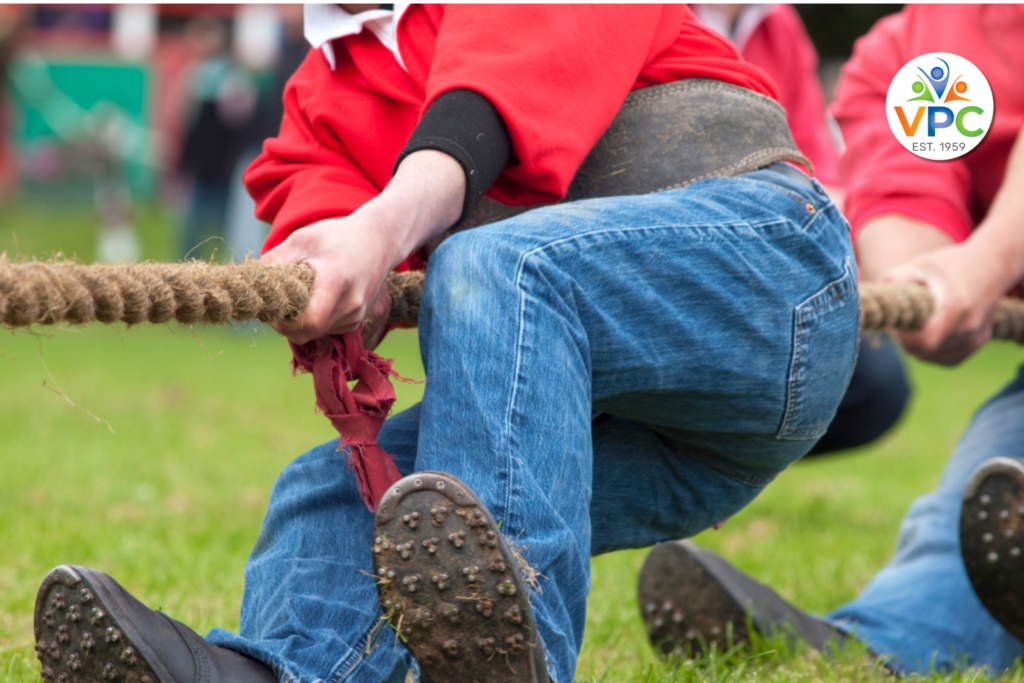
It doesn’t have to be a tug-of-war!
FINDING EASE IN THE RELATIONSHIP WITH YOUR CHILD – IT DOESN’T HAVE TO BE A TUG-OF-WAR!
The game of tug-a-war
Do you remember the game ‘tug-of-war’? You probably have some idea of what it is. I remember playing it in sport.
We were divided into two teams of equal numbers. Each team was positioned along either side of a thick rope, and a ribbon tied in the exact middle of the rope. The ribbon was then placed over a line on the ground. The winning team was the one that pulled hard enough that the ribbon crossed the midline to their side. The game began when the teacher blew the whistle. In the seconds before that, there was tension in the rope as each side jostled for the right amount of strength for a win. At the sound of the whistle, each team pulled and heaved as hard as possible, straining and digging their heels into the ground to gain traction. Eventually, exhausted muscles give way to the stronger side, and the fallen lay on the ground, spent and defeated.
You and your child
It is common to feel like your relationship with your child (or one of them) constantly feels like a tug-of-war. You say one thing, and they respond with the opposite. An example might look like this;
Parent: “Can you unpack the dishwasher please?”
Teen: (Lying on couch scrolling) “Later”.
Parent: “Now please!”
Teen: (eye rolls, no response and keeps scrolling)
Parent: (tone and volume of voice increasing). “I asked you to do it now? Is it really so hard? I have been at work all day and all I am asking you to do is empty the dishwasher which will take you 5 minutes. I’m not asking you to climb Mt Everest!”
You can see where this is going. And, the result is the same whether the teen in this situation begrudgingly agrees but mutters some expletives under their breath or yells back and leaves the room, refusing to do as asked, or silently complies and then goes to their room. Whichever option arises, you both feel stressed and poorly understood. This is the tug-of-war where too much effort is spent trying to win the game.
Sometimes, trying to keep your child doing what you think they should be doing, in the way you think they should be doing things, can be exhausting. The bigger and older they get, the harder it can be to win. There may be more to this game than winning – particularly when the competition is your child. Maybe, it is more about the training and mentorship you provide them, as this builds the strength and resilience they need to stay in the game.
How to ease the tension
Tension in a relationship creates stress, which both parties feel. As soon as stress is involved, it means your fight and flight response is engaged, and that means no one will be able to deal with the problem calmly. In the tug-of-war metaphor, both you and your child are pulling hard to win because stress gives your body the feeling that a disaster is about to happen. Your child has the same stress response as you. It works in the same way. What is different is that they have less world experience and are less mature than you. In a parent-child relationship, the most mature person is always you the parent. Therefore, you are the one who needs to reduce the tension and create some slack in the rope without letting go completely. This means understanding that your child needs help with something that may not be obvious yet.
What does this mean?
As a parent, you should never be in competition with your child. Your relationship with them is not a win-lose game. It is about understanding them, supporting them and developing your relationship with them. This means you are getting to know who they are as they develop into a unique person. It means accepting that they will do things differently to you. The biggest challenge is understanding that their emotional dysregulation is their immature and inexperienced way of saying, “I don’t feel good, and I need some help with this..”
Question perfection
Everyone has a way they like to do things because it always works for them – including you. However, you can’t expect your child/teen to do everything your way . Accepting that there are often many different ways to get a job done or to solve a problem can help reduce the tension. Instead of trying to “win” all the time, find small moments of balance or compromise. This will help you let go of the tug-of-war rope and prioritise based on the moment.
Modelling self-regulation
Emotion regulation is a challenging and complex skill. One way your children learn about it is through observation. They watch you to see how you manage difficult situations and emotions. Modelling emotional regulation helps them to learn this skill and build their resilience and capacity to manage stress. Remember, it is not about doing things perfectly. Some days, the stress is too much, and you will blow your stack. However, in a calmer moment, reflecting on the situation and discussing what happened together will teach them a better way to manage a stressful situation.
Collaborative problem-solving
Instead of seeing discipline as a win-lose tug-of-war, consider reframing it and see it as a chance for collaborative problem-solving. This will also allow you to “ease the tension out of the rope.” By involving your child in finding solutions and discussing consequences, they will learn responsibility and respect for boundaries.
Encouraging emotional awareness
Teaching children to recognise and name their emotions, talk about their struggles, and work through conflicting feelings gives them tools to manage their internal tug-of-war. For example, if they feel nervous and unsure about a new activity, you can help them understand and balance their feelings so that they can participate rather than avoid it altogether.
A final thought
Tug-of-war is a win-or-lose game where the biggest and strongest side wins. This is not what you want to play with your children as they are growing and becoming unique individuals. The aim is to have manageable stress levels that ebb and flow rather than persistently high stress that injures your relationship and compromises everyone’s physical and mental health.
The rope is the connection between you and them and is always there. If they pull too hard in the wrong direction, you must apply some counterweight to ease them back and help them on course. Equally, you want to allow them enough rope to explore their world and decision-making capacity without holding it too tightly.
Katrina Gow
Katrina is a compassionate and skilled counsellor dedicated to fostering mental health and resilience. In 2025, she will contribute her expertise as an advisor to a Deakin University project addressing school attendance issues, helping develop strategies for improving educational outcomes. Additionally, Katrina is part of the Victorian Parents Council team and writes insightful blogs for the VPC, offering support and guidance to parents navigating challenges in education and parenting. Through her work, she strives to create positive change in both individual lives and broader community settings.

